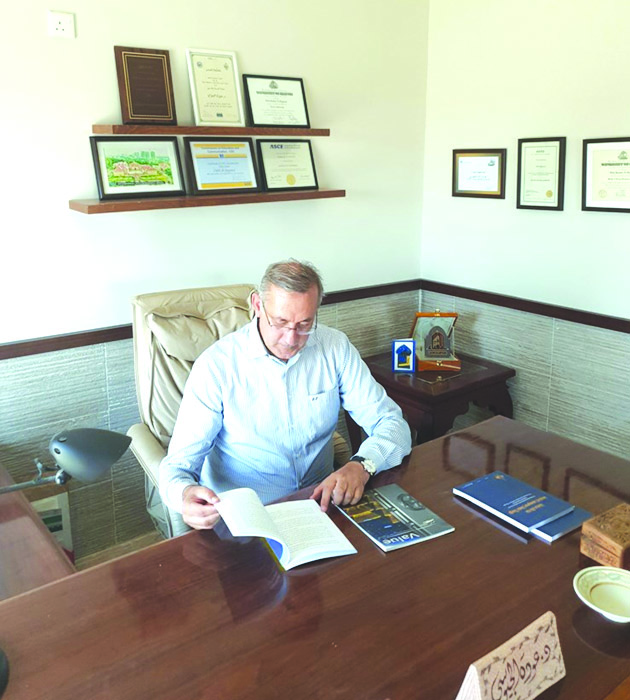Leveraging his position at the U.N. since 2015 to capture a larger audience, Odeh Rashid al-Jayyousi has called on the international community to build an Islamic financial endowment for combating global warming.

As climate change threatens the entirety of the world, many people are turning to the religious traditions to find inspiration for the environmental movement. One such figure isOdeh Rashid al-Jayyousi, a 58-year-old Palestinian academic who serves on the Scientific and Technical Advisory Panel at the United Nations and leads the little-known but fast-growing field of eco-theology, the study of religions’ calls to protect the natural environment. Muslim disciples of this idea cite eco-friendly verses of the Quran to argue that Islam obliges its followers to fight environmental degradation, promote sustainable development and stop global warming.
“Islam as a way of life provides remedies to the global debate on growth and sustainability,” says al-Jayyousi, chair of the innovation and technology management department at Arabian Gulf University in Bahrain. “Islam views the role of the individual as a value and knowledge creator, a steward, a witness and a reformer who strives to contribute to progress and a good life.”
Eco-theology has developed a small following in corners of the Muslim world from Indonesia to Morocco, but the academic discipline has yet to spark the kind of social movement that Muslim environmentalists envision.
“What impresses me about Dr. Jayyousi is his approach to linking the principles of the current concepts of sustainable development and environmental protection with the teachings and principles of the Islamic religion and Arab heritage,” says Waleed Zubari, professor of water resource management at Arabian Gulf University.
Born in the West Bank city of Tulkarm in 1961, al-Jayyousi has spent much of his life in a region in turmoil, but the Middle East’s history of conflicts has never detracted from his lifelong love of nature. In the ruinous aftermath of the Six-Day War the 1967 battle between Israel and its Arab neighbors he distracted himself by catching grasshoppers and playing in orchards, an extension of his wider love for interacting with the natural environment.
Al-Jayyousi’s academic and professional career took him far from the insects and orchards of the West Bank. He got a bachelor’s degree in civil engineering from Yarmouk University in Jordan in 1983 before moving to the United States, where he earned a master’s degree and a doctorate in urban planning from the University of Illinois at Chicago. Prior to arriving at Arabian Gulf University in 2015, al-Jayyousi taught environmental science at a Jordanian university for 11 years and launched the Middle Eastern office of the International Union for Conservation of Nature, an environmental organization headquartered in Switzerland. al-Jayyousi even dabbled in writing children’s literature as a hobby.
The Palestinian professor’s expanding list of accomplishments has included advising the United States Agency for International Development, establishing a doctoral program of 50 students at Arabian Gulf University and overseeing an initiative that encourages Syrian refugees in Jordan to start green businesses. Islam and Sustainable Development is the 2012 book where he first made his case for an Islamic approach to environmentalism. Since then, al-Jayyousi has evolved into one of eco-theology’s most prominent advocates.
Leveraging his position at the U.N. since 2015 to capture a larger audience, al-Jayyousi has called on the international community to build an Islamic financial endowment for combating global warming. “Civil society activism in the Muslim world should support and nurture a green way of life in line with the Islamic worldview,” says al-Jayyousi. This activism is one form of struggle to ensure balance and harmony between humans and nature. His work has earned a bevy of academic citations, and several countries in the region, including Qatar and the United Arab Emirates, have hosted conferences and research institutes dedicated to the relationship between ecology and Islam.
Despite al-Jayyousi’s reach and the novelty of his ideas, he must overcome several hurdles if he hopes to convert the Muslim world’s many hundreds of millions of inhabitants to eco-theology. Ä°brahim Ãzdemir, founding president of HasanKalyoncu University in Turkey and author of The Ethical Dimension of Human Attitude Towards Nature: A Muslim Perspective, notes that Muslim environmentalists often face the accusation that they “serve Western and colonialist agendas.”
On a wider level, al-Jayyousi will have to make eco-theology accessible to Muslims less steeped in its sometimes esoteric teachings. “These Muslims adopt secular approaches to most problems, including the environmental one, and it’s not easy for them to switch gears and see that the Islamic tradition itself, which they have known only superficially, has wonderful solutions,” says Tarik M. Quadir, an assistant professor of philosophy at Necmettin Erbakan University in Turkey and the author of Traditional Islamic Environmentalism: The Vision of Seyyed Hossein Nasr.
In the face of these challenges, al-Jayyousi remains steadfast, asserting that eco-theology can pave the road to an eco-friendly future after the modern world led us astray. “It is imperative that we rethink educational systems that neglect the beauty and majesty of the powers around us in nature,” says al-Jayyousi.

COMMENTS